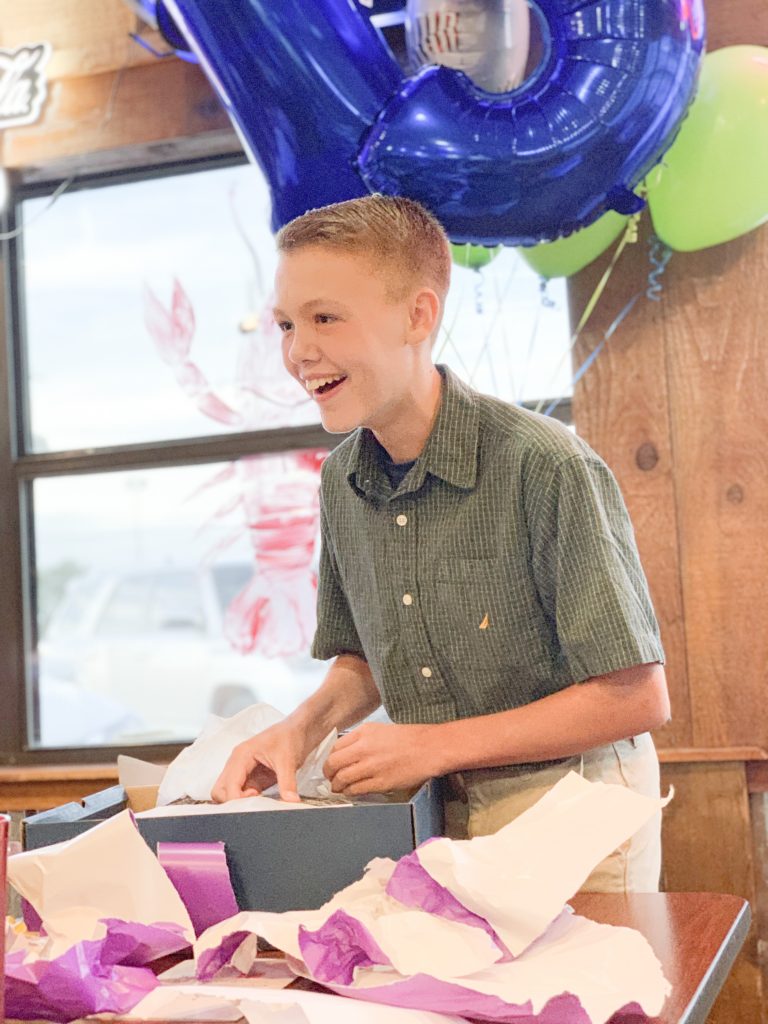Twenty-eleven was a turning point for us. We started changing the way we looked at money, and we experienced so many new things. We were budgeting together, getting on the same page with our finances, and quickly paying off debt.
One of the areas that many families struggle with when trying to get on the same page with their finances and budgeting is their kids. Some have grown kids by this time, and some have younger ones and babies. Either way, this can really throw a wrench in all your budgeting plans when your kids just aren’t used to the “new” way mom and dad are living now.
Although a total shift in mindset didn’t completely take place until a few years later, we were making some pretty remarkable progress we’d never seen before.
This was really different.
That means it was really different for our older kid, too. He was six at the time; and while that may seem really young (and it is), he’s been living a totally different way for the first six years of his life. And for those of you who know how important the first 5-6 years of a child’s life is, it had already made an impression on him.
And so goes the saying, “You can’t teach an old dog new tricks.” You can – even though the older they are, the harder it is. Trust me. You can. Even if they’re teenagers. You can!
Now he’s thirteen (ahhhh!), and we’re so proud of the young man he’s becoming.
NEVER did I think that we knew exactly what we were doing and that everything we were doing would pay off, we were just trying the best we could at the moment. I’ve spent the last several years reading and listening to podcasts, reading and listening to podcasts, reading and listening to podcasts. I still do this! So now I’m sharing all this good stuff with you!
Before I get into the details of what we told our oldest about money, I want to share with you a special thirteenth birthday celebration. I can’t take full credit for this, so I want to first mention that I got this idea from Emily at Jones Design Company. She has a blog, and you can check out her video about their thirteenth birthday celebration here.
Part of this idea comes from the Jewish Bar/Bat Mitzvah, when they celebrate the “coming of age” of a boy or girl as they enter the stage in life where they can now be responsible for themselves. As Emily states in the video, thirteen is such a weird stage in a child’s life, right? They’re not quite an adult yet, but they’re not quite a little child either. They’re experiencing some really big changes happening in their own bodies, and their hormones are about to explode.
What better way to celebrate them than to have all the special adults come together to pour into them at the most vulnerable time in their life – to acknowledge that they are still there for them, and they care. Of course, we’re super blessed to have more than just 12 special adults in his life right now, but we just couldn’t invite (nor afford) everyone we knew!
I think we’ll continue to do this for all of our kids, but we may do it different for each of them. All of our kids are different, so we’ll cross that bridge when it gets here. For our oldest, he loved the idea of an “adult” dinner without his little siblings around. We treated the adult immediate family members to a dinner at a restaurant of his choosing, and I asked for each person to bring a word of encouragement or advice as he enters this new season of life.
I had no idea I’d be a big baby and crying over all of this, but yes that did happen! I’d been crying all day off and on just thinking about what I’d say in front of everyone at the dinner. I simply thanked them for always being there for us when we need them and that they’re a big part of our lives and raising our kids. Everyone there has had a major impact on his life, so this was about them too.
We’re so blessed to have the family that we have around us because I know from experience that not everyone has that.

Everyone was able to take their turn pouring into him and sharing their thoughts with the birthday boy. Some had cards as keepsakes that were read to him, and some just shared their words directly. Afterwards, I asked him how he liked his adult dinner, and he said, “It was phenomenal.”
I just can’t express how far this boy has come from the little wild child that struggled to sit still in class, didn’t care about his school work, and was beginning to be pushed off as another ADHD story and problem child.

Even though there were many things we’ve been doing as parents to help shape his life so far, I do believe that one of the most helpful things we did was to teach him how money really works and to involve him in the process we were learning.
All this new budgeting stuff forced us to make some really hard decisions about how we were going to use our money better.
…by now, you may have caught on to the secret of personal finance: Money is never just about money. Sure, you and your kids have to do the details – things like budgeting and keeping your checking accounts balanced – but there’s so much more to consider. Winning with money also means getting comfortable doing some good, old-fashioned hard work. It means learning patience, delayed gratification, and contentment. It means developing the heart of a giver.
from Smart Money Smart Kids
By now, I’ve seen first hand how teaching kids the truth about money plays a huge role in their future maturity in many areas of their life:
- They realize that mom and dad aren’t buying things they want anymore – they must save up for it.
- They realize that mom and dad aren’t their personal BANK or ATM – money comes from WORK.
- They realize that “giving” comes from your inner self, and that giving does not involve mom and dad giving FOR you. It’s something YOU must do, and mom and dad don’t give FOR you – it’s your responsibility. Giving is fun, and you can get creative with it.
I’d say that’s some pretty big life lessons that many adults don’t even fully understand yet.
So how do you teach that?
One important thing to note is this: They’re watching us. Do we spend money on a whim? Do we work hard for our money? Do we talk about money openly? Do we fight about money? Are we responsible with our money? Do we pay our bills late and spend our money on something else instead? Do we wait and save up for things, practicing patience? Are we givers?
I’ll share exactly what we did and will continue to do, and you can take these ideas and run with it.
First, I sat down with our oldest one day and had a talk. Remember, at this time this was VERY different than what we were used to. Now, it’s just our way of life and nothing out of the ordinary.
He was only six years old. Our conversation went a little something like this:
“Now that you’re old enough to understand more things, there’s going to be some changes starting right now. From now on, Mom and Dad won’t be buying you things that you want. We will always buy everything you need – toothbrushes, toilet paper, clothes, food, etc. But from now on, you will have some work to do to earn money. If you want something, you will need to save up that money and buy it yourself.”
He was all ears and agreed to everything I said. I also explained to him that money comes from work.
“Money does not appear from the sky or magically appear in our bank account. Mom and Dad work for the money that we make, and if we’re not wise with our decisions, we won’t have any left for important things. And that’s why we want to teach this to you right now. We want you to learn as much as you can about how money works before you get out into the world on your own, and the best place to learn is right now while you’re still living with us.”
During this same conversation, I had a paper and pencil and took notes. We talked about chores and work around the house.
“You will have some work to do around here to have the opportunity to earn some money. You will also have some work to do around here that you won’t get paid for because you have the privilege of living here. We should always be thankful for all the little things that we don’t realize sometimes. A roof over your head is a big deal, and by you doing your chores and helping take care of our household, that means you’re thankful.
So let’s talk about which chores you will get paid for and which ones you won’t…”
He understood every word. It wasn’t necessarily easy sailing from then on either. Because this was all new, we often had to remind him of his responsibilities and why he was doing them. He had what we call a boudé face many times when first starting this new routine.
It was really hard for me at first, too. Even just for a pack of gum, I wasn’t buying it at checkout. I know that sounds so harsh, but I was trying to teach a lesson. Until he got it set in stone, we didn’t buy ANYTHING except for birthdays or other special events. Now, I will buy the gum or the mints every now and then – but I don’t even have to because they’re beating me to it!
They want to buy their own stuff now, and almost every time we go to the store, it’s “Mom, I’m going get my money so I can buy something!”
It was a slow process, but eventually it became the normal way of life around here. Since our other two kids grew up with this mentality from birth, it now comes natural to them also. They don’t expect us to buy them things – they want to see what they can do to earn their own money so they can buy their own stuff.
We slowly started to see our oldest change and do things he never used to do. He became more eager to work, and less hesitant to help and work without being asked. He would also come up with his own ideas of how to work and make money.
How we put this into action:
CHORES LIST
Call it what you want – responsibilities, chores, work list, to-do list, etc. Whatever works.
I came up with some ideas, and I let him give input as well. I got some great ideas from the book mentioned above, and also from Making Children Mind without Losing Yours and Parenting Your Powerful Child. You can certainly go about this any way you’d like, just as long as they’re learning to take responsibility for their actions. No work, no pay. Work = pay.
Of course, there’s some age-appropriate chores. You’re not going to have your 4 year old take out the trash when he’s not even as tall as the trash can yet! Keep those things in mind, as there ARE many things that the tiny kids can do. As young as three, they can “clean up” their toy mess for 50 cents in a clear jar where they can SEE their progress. For this age, it’s all about SEEING it right away.
Here’s some ideas of things we’ve done for PAID CHORES:
4 – 6 years:
Cleaning up toys (even though you may have to help pick up ⅓ of it)
Wiping things down (windows, toys, dinner table)
Setting the table
Bringing dirty kitchen towels to the laundry room
Picking up clean silverware
Feed the dog
7 – 8 years:
Unloading dishwasher/picking up dishes
Washing/rinsing dishes
Hanging clothes Folding towels
Taking out bathroom trash
Wiping down counters & table
Bathe the dog
9 – 11 years:
Taking out trash
Cleaning the bathroom
Sweeping/Vacuuming
Pulling weeds out the garden
Watering the garden
Hanging clothes
10 – 12 years:
Yard work
Taking out trash and bringing it to the road for pickup
Cleaning the bathroom
Washing and picking up dishes
Folding clothes Sweeping/vacuuming
13 & up:
All of the above when needed
Keep in mind that NOT all of these were put into action at the same time. Also, when your child gets to high school, they may need to focus more on their studies and less on tons of chores – advice from Dr. Kevin Leman. You can give them bigger chores, but less of them. If you have other kids, they can rotate chores and take on more responsibilities when the older one gets to high school. I guess we’ll see how that goes when we get there!


ENVELOPES FOR GIVING, SPENDING, AND SAVING
The older ones can be paid once per week and the younger ones can be paid as soon as the chore is done. Many of these are not daily tasks. The daily tasks are not usually the paid chores anyways (listed below). For the little ones, it’s all about visualizing it and learning the basics of work equals money. I recommend something see-through, such as a glass jar.

Once the older ones get paid, they’re required to sort them into 3 categories – Giving, Saving, and Spending. Why? Because that’s real life! With every single paycheck, we should be giving, saving and spending. If we keep it all, that’s a problem; if we spend it all, that’s a problem.
They can be sorted using plastic zipper bags, regular envelopes, or these cute printable ones you can download here.
Encourage them to set goals for their savings. We shouldn’t save money just for the sake of saving. That’s called hoarding. What are you saving up for? Your money should have a purpose.
What is a giving goal you have? Do you want to bake a cake for an outreach? Do you want to save it up and donate it to someone in need? Use your giving money to do that.
Spending money can be used for smaller purchases like ice cream cones for an outing or gum at the checkout line. Help them to organize it in a way that makes sense for them and their life.
This is basic budgeting 101 for kids.
I promise you that if you’ve done this for some time, they’ll be ready for their own checking account at thirteen. Then, you can just directly deposit their work money into their account.
GUIDANCE FOR THEIR SPENDING
Even though they’ve saved up for their purchases, they’re still kids and probably aren’t too good at making sound decisions just yet. There are some things that you just wouldn’t buy your 8-year old, so you shouldn’t let them either, and that’s okay. Don’t let them buy it, and you can explain why and when they can buy it later if they want.
THE AMOUNT TO PAY
We tried a few different methods. I think it’s a good starting point to pick a few chores as paid chores that everyone agrees upon, and then decide on the amount to be paid every time that chore is completed. Have a checklist that they’re responsible for, and they’ll need to check it off when done.
At the end of the week, or even on a Sunday evening, they can turn in their “timesheets,” and get paid.
Examples of what we’ve done:
wash dishes – $1
Feed dog everyday – $1 (for the week)
bathe dog – $4
Unload dishwasher as needed – $1 (for the week)
take out trash – 50¢ every time
We mainly used that method when they were younger.
Now, they’re pretty much on salary [LOL]. We give them each $5 per week for everything they’re responsible for. Consider the time spent. Some jobs only take about 5 min, and some take about 10 min.
We also used to have a paper with circles on it that had 50¢ written in the middle of each circle. All the circles totaled $5. Every time they had to be reminded of their job, they got a circle X’d out. When getting paid, they didn’t get paid for those that had X’s on them.
I read this phrase somewhere — Never expect what you don’t inspect. That’s a good saying!
What we do NOT pay for:
Making your bed. This is simply showing gratitude for what you have. Not everyone has a bed, so if you have one, you better be making it. If you don’t want to make a bed, sleep on the floor. No joke.
Grooming – brushing teeth, getting dressed, fixing hair. This is showing respect for your own body. We must take care of ourselves, for our body is a temple, and the reward for this is GOOD HYGIENE. You will feel better and have more confidence when you look and feel good.
Good grades. This can be controversial in many families, but I’ve heard it many different ways that made sense to us. One is this – don’t reward your kids for something they should be doing anyways. Another is this – some kids are naturally good at making good grades, and some naturally struggle in school. It’s not even close to being fair when one kid is repetitively rewarded for straight A’s and doesn’t have to try hard, while the other kid tries with all his might to make a C+. Easy fix – don’t pay for it.
If we spend $40 on them somewhere because they got straight A’s, what will they expect next when they make straight A’s again? Then when they get to college? That’s not real life! They’ll eventually expect all those things and feel less-than when they don’t get them in real life.
The school WILL reward their good grades.
The REAL REWARD is self-satisfaction in their striving for excellence and keeping a good attitude.
Tell them that they’re smart, they’re awesome, and you’re proud of their school work and behavior. Take them to their favorite restaurant. These are small ways that make a BIG impact and make someone feel special without going over-the-top.
Good behavior in school or sports achievements. These are rewarded by simply telling them we’re proud of their hard work. The most rewarding feeling is knowing that your mom and dad are PROUD of you for your hard work and for your good character traits. Your work doesn’t define you – your character does. How you handle tough situations shows your maturity and true character deep down inside. This is something worth noting. Again, some kids may not be good at sports or may not have the cognitive maturity yet to sit still in class.
Don’t worry, the school and the sports programs will reward them with certificates and trophies if they work hard enough. At the end of our homeschool year, I do reward them with one unique certificate for a skill or special strength they’ve shown or improved upon all year.
Rewarding a child for everything they do good can make them think that they only matter when they DO things good. However, they should feel as though they matter NO MATTER WHAT. They don’t ONLY matter when they do good on the baseball or football field or swimming pool. So we must ask ourselves, “Is this the only time I’m cheering for my child? …when they’re on the sports field or in the classroom sitting still?” I need to make sure I’m encouraging good behavior and hard work outside of those things.
Their character matters more than anything else in their life, which is what will make you the most proud of them when they’re older and off on their own. A pat on the back and a genuine Thank You goes a LONG way.
Keeping their room clean, picking up after themselves, and picking up their own clean laundry. This is something that should be done regardless. This also goes back to gratefulness for what you have. Picking up after yourself is a sign of maturity.
You pick up after yourself, or I will pay your sibling to do it and deduct from your weekly pay. OR I will deduct from your weekly pay for every time I had to pick up. They’ll learn really quickly that having no money leftover is no fun.
For all of these UNPAID responsibilities, they do come with consequences if they’re not done. You want to go to a friend’s house, play on the iPad, or go fishing? You might want to make sure that stuff is taken care of.
Some other ideas we’ll be doing soon is to also let them start planning family vacations and finding good deals online. Show them how to pay a few online bills and make them responsible for making the payment for you.
Final notes…
I have to say that I wasn’t all that pleased with how our oldest reacted when someone gave him a gift when he was younger. We always had big fabulous birthday parties which included a million gifts from the guests, as they would tear through all the presents. Now that they fully understand how much work it takes to make money, they can understand how much things really cost.
Now, I see them light up when someone buys them something, and the gratitude is visible.
It’s okay to talk about money and the realness of the family budget with your kids. Tell them how life really is, and they won’t be so surprised when it slaps them in the face. Because one day it will. And you will be so proud of how they handled it.
It’s a lot of hard work when they’re little, which is why so many people don’t do all of these things anymore. We’re too busy today, and these old-school practices have slowly made their way out of this generation. Unfortunately, that approach has brewed up quite a bit of entitlement in today’s culture. But all the hard work now will pay off when they’re older!
This is a way of investing in your kids NOW, so when they become adults, they got this! The investment is worth it. Our 13-year old is now very responsible with his money, knows how much he has, spends it wisely, and doesn’t ask for anything from us. He’s ready to get a job to start saving for his first car, and he’s been disappointed that he can’t really get a “real” job yet. The best part of all is that he has the heart of a giver. I guess I’ll have to do another update when he’s 25!
Again, this is in no way an exhaustive list of things we do or don’t do, but simply some ideas of things we’ve implemented over the years and have seen monumental progress with. I hope it inspires you teach your kids about money and use some of the examples I’ve shared!
Also, please comment below with more ideas if you have some!



 Being Debt-Free is NOT about Being-Debt Free!
Being Debt-Free is NOT about Being-Debt Free!